.
China’s Poly Technologies to produce potash in Ethiopia
.
The Chinese Poly Technologies, already engaged in natural gas and petroleum exploration projects in Ethiopia, announced its desire to produce potash in the country.
Vice President of the Company, Li met President Mulatu Teshome (PhD) and discussed the company’s activities in the country. President Mulatu on the occasion noted that the company is performing very well and expressed his encouragement for the company to conduct its projects with efficiency.
“Poly Technologies will play a crucial role in the industrial transformation of the country with its production of petroleum and potash,” Mulatu added.
Li on his part said the company will strive for quality and efficiency and aims to create job opportunities for more than 700 Ethiopians before the year 2016.
Poly Technologies Inc. is a subsidiary of China Poly Group. Poly GCL claims that China Poly is one of the most influential state-owned enterprises in China engaged in natural resources investment and development, real estate development, culture and art business, and international trade.
.
China hands over Tirunesh-Beijing Hospital to Ethiopia
.
The Chinese government on Wednesday handed over the Tirunesh-Beijing Ethio-China Friendship Hospital to Ethiopia in a ceremony held in the presence of Jiang Yaoping, vice-minister of commerce.
The state-of-the-art hospital named after Tirunesh Dibaba, the Ethiopian female athlete who won two gold medals at the 2008 Beijing Olympics, was built by the Chinese government at a cost of USD 12.7 million to promote Sino-Ethiopian friendship.
Jiang and Kebede Worku, state minister of health, signed the certificate marking the handover of the project in the presence of diplomats and government officials from the two countries.
Kebede said the hospital is a symbol of the strong, dynamic and blossoming partnership between the two countries adding that the friendship between the two countries has gone from strength to strength in the last decade.
“I wish to take this opportunity to express our profound appreciation of the huge investments being made by the Chinese people and government in support of our accelerated development efforts in so many areas,” he said.
.
Pan African Parliament to observe Ethiopian election
.
Pan African Parliament announced that it is preparing to observe the upcoming general election in Ethiopia which will take place in May.
The Parliament will deploy its observers to witness and make sure that the election is fair and democratic, Ashebir Woldegiorgis (MD), Deputy President of the Parliament, said.
According to him, half of the observers who are going to be deployed under the African Union will be drawn from the Parliament.
The Parliament will organize meetings to build knowledge of voters regarding the constitution and election guidelines so as to enable voters exercise their rights, Ashebr said.
Deploying observers to African countries was not a priority in the continent previously, but consecutive activities carried out by the African Union and United Nations regarding this changed the situation, he said.
Cognizing the importance of observing elections, the Pan African Parliament has started to deploy its observers to African countries to monitor the democratization of electoral process, he added.
http://www.thereporterethiopia.com/index.php/news-headlines/item/3033-news-in-brief
.
Ethiopian bags 3.15 bln birr
.
Acquires B787 simulator
Ethiopian Airlines Aviation Group made a record high profit of 3.15 billion birr in the 2013-2014 fiscal year that ended in June 2014.
The net profit is the highest the airline made in its 69 year history and surpassed the net profit it bagged last year by 53 percent. Last fiscal year the airline made a net profit of 2.3 billion birr. According to information obtained from the airline, the national flag carrier generated 46.5 billion birr operating revenue, up by 21 percent. The airline transported six million passengers and 187,000 tons of cargo in the budget year, a surge of 13 and seven percent respectively. In the 2013-2014 fiscal year the airline phased in 13 new jetliners and opened nine new destinations.
A senior official at Ethiopian told The Reporter that the airline managed to make a record high profit at a turbulent time. The economic recession in Europe, fuel price hike, and the Ebola Virus outbreak in West Africa are some of the critical challenges Ethiopian Airlines and other international airlines faced. The flag carrier recently announced that it was losing eight million dollars in sales every month due to the Ebola pandemic that scared away passengers from traveling to Africa.
The official attributed the remarkable performance of the airline to the implementation of a right business strategy stipulated in the Vision 2025, the airlines 15 growth plan, and the hard work of the management and employees of the airline. “It was a very successful year for the airline,” the official said.
Ethiopian Airlines amassed ten international awards in the fiscal year. The African Airlines Association crowned Ethiopian as best airline of the year last November in Algiers, Algeria while the International Air Transport Association (IATA) ranked it the largest carrier in Africa in terms of revenue and profit. Ethiopian Airlines has also won prestigious awards from the American aircraft manufacturer, Boeing, and the Canadian air framer, Bombardier.
Ethiopian registered the historic performance at a time when most prominent African carriers reported spiral loses. The neighboring and arch-rival of Ethiopian Airlines, Kenya Airways, reported a net loss of 139 million dollars in six months (from April to September 2014), South African Airways registered a net loss of 223 million dollars in the fiscal year ending March 2014 and Africa’s oldest airline, Egypt Air, incurred a net loss of 350 million dollars in the fiscal year that ended June 2014.
The prominent aviation analyst CAPA last week revealed that Ethiopian Airlines is planning further fleet and network expansion in 2015, enabling the flag carrier to widen the gap with other leading African carriers. Ethiopian has already become the largest airline in Africa based on fleet size and could overtake South African Airlines in 2015 as the largest based on passengers carried.
The report issued by CAPA last week stated that Ethiopian has doubled in size since the beginning of the decade while most other major African carriers have grown only slightly or not at all. “Asia and Africa have been, and will continue to be, the primary drivers as Ethiopian taps the booming Asia-Africa market,” the report said.
Ethiopian plans to launch services to Tokyo in Apr-2015, which will become its 11th destination in Asia. The carrier will also add its second US destination in June 2015 as service to Los Angeles is launched.
Ethiopian is one of only four airlines in Africa with over 5 million annual passengers. It is also one of only four airline groups with a fleet of more than 50 aircraft, according to CAPA.
Currently, Ethiopian Airlines serves 84 international destinations with 67 modern aircraft with an average age of seven years. The fleet includes state of the art jetliners including the B787 Dreamliner and B777. By 2025 the airline plans to carry 18 million passengers to 92 destinations by 120 modern aircraft. It also plans to generate an operating revenue of 10 billion dollars.
Ethiopian Airlines Group CEO, Tewolde Gebremariam, told The Reporter that the airline is already accomplishing the Vision 2025 targets. Ethiopian is investing on start up airlines in Africa. The state-owned flag carrier owns a stake on the Lome-based Pan African airline, ASKY. Recently, it invested on another start up airline in Malawi, Malawi Airlines Ltd. The management of Ethiopian recently signed a memorandum of understanding with the South Sudanese government that enables the young nation establish a national airline. Ethiopian is also eyeing Rwanda and DRC Congo for the establishment of another regional hub. Tewolde said having a multi hub is one of the business strategies stipulated in the Vision 2025 growth plan.
In a related news, Ethiopian acquired the first Boeing B787 Dreamliner full flight simulator in Africa at a cost of 20 million dollars. In a statement to The Reporter Ethiopian said the installation and build of the full flight simulator is in the process at Ethiopian main hub in Addis Ababa adding that the first pilot training in the B787 flight simulator will start in March this year. Ethiopian provides full flight simulator for pilots on the Q-400, B737, B757 and B767.
http://www.thereporterethiopia.com/index.php/news-headlines/item/3041-ethiopian-bags-315-bln-birr
.
ADPI to submit report on mega airport project
.

Bole International Airport expansion
.
The French consulting firm, ADPI, will submit its preliminary report on the development of the new mega international airport project that the Ethiopian Airports Enterprise (EAE) is planning to build outside Addis Ababa.
ADPI launched the study on site location last September. A senior official at the Ethiopian Airports Enterprise told The Reporter that ADPI is finalizing the preliminary report adding that it will submit the report to the enterprise next month.
EAE is planning to build a new mega international airport outside Addis Ababa. Dukem, Modjo and Teji towns are proposed for the building of the new international airport. A decision has not yet been made. The enterprise is also expanding the Addis Ababa Bole International Airport passenger terminal at a cost of 250 million dollars.
Last July the enterprise hired ADPI which is tasked to supervise the construction of the Addis Ababa Bole International Airport passenger terminal and undertake a study on the new international airport. The second task includes conducting a study on the site location for the new international airport. The consultant will also undertake feasibility, technical, and financial studies as well as drafts airport master plan. The consultant is also tasked to study the integration of the new airport with the Addis Ababa Bole International Airport.
The Ethiopian Airports Enterprise has embarked on the construction of the Addis Ababa Bole International Airport passenger terminal expansion work. ADPI deployed two groups in Ethiopia. The first group is supervising the Bole expansion project while the second group is undertaking a study on the planned international airport.
The official said, based on ADPI’s recommendation, a decision will be made on the site for the construction of the mega hub. Sources close to the project told The Reporter that it is the Mojo site that will be selected for the construction of the mega hub because of the well developed infrastructure and the low altitude of the location compared to Addis Ababa.
“The only problem with the Mojo site its proximity to the Ethiopian Airforce main base,” the source said. A joint committee drawn from the EAE and Ethiopian Air force is working on the site location, the source added.
Though the Ethiopian Airports Enterprise is building new airports and upgrading the existing ones the airports with hundreds of millions of birr, they are not generating revenue. It is only the Addis Ababa Bole International Airport that operates with a breakeven. The other airports in the regional states generate little or no income at all. Most of the airports in the regions accommodate only one aircraft per day.
EAE has hired an international consulting firm to examine the possibilities that all the airports could generate better revenues. The global consultancy firm, Grant Thornton, is currently working on the study. EAE has also hired Ernst & Young to implement a new computerized system at a cost of 46 million birr.
.
Karuturi under the spotlight
.

Ram Karuturi
.
Officials fretful on loan repayment, land lease and country’s image
CEO says will settle local debts this month
It has been over a year since the Ethiopian government expressed discontent with the performance of the Indian giant, Karuturi Global Limited, a company engaged in the business of commercial farming.
Karuturi Global, which earlier agreed with the Ministry of Agriculture (MoA) to grow wheat on 300 thousand hectares of fertile land has fell to deliver its promises of becoming a leading agricultural company.
Karuturi was almost foreclosed after failing to repay a 65 million birr (a little over USD three million) loan extended via overdraft facility from the state-owned Commercial Bank of Ethiopia (CBE). However, the company immediately settled the minimum, 25 percent of the debt. But government officials told The Reporter that Karuturi is no longer reputed in Ethiopia.
Abera Mulat, director of agricultural investment and land administration agency, at the MoA told The Reporter that Karuturi no longer a reputable company in Ethiopia. According to Abera, the Indian giant has failed to deliver. The official went on to say that Karuturi is on the verge of collapsing in Ethiopia. “Karuturi has gone bankrupt following internal management crisis,” Abera said.
In a telephone interview from Bangalore, India, Ram Karuturi, CEO of the company, told The Reporter that he will continue investing in Ethiopia. Currently, he is selling out machineries and equipment worth some 15 million birr to repay debts the company has incurred here. Karuturi is known for borrowing from CBE, Dashen and Zemen banks. The loan extended to the company exceeds 170 million birr and the CEO said that his company is set to settle the debts by the end of this month.
The multimillion dollar company has been flouting stock shares at the international market intending to raise capital. Officials reason out that the rift among the 19 figures of the Karuturi Group at global level is the result for Karuturi to go down. But Karuturi pointed at government officials for some of the challenges his company is facing. The recent announcement of Karuturi’s selling out of machineries and equipment and other accessories prompted the concerns of local officials. However, Ram Karuturi denied that selling out those machineries is based on the intention of settling debts. Furthermore, he said that the company is selling out the surplus equipment it had in the farms. According to the CEO, the company has a USD 70 million worth of machineries in Ethiopia.
Abera recalled that the company was privileged to acquire massive farm land with the lowest level of lease agreements. The lease price was way below one dollar, according to Abera. In addition to that the government has provided huge duty free incentives, he mentioned.
In its 2011 annual report to the shareholders, Karuturi claimed that its operation in Ethiopia was causing delays due to logistics and local clearances. But its investment was probed right from the beginning when it has flouted shares at stock markets for the sale of the massive farm land, in the Gambella Regional State.
Ambitious Karuturi again was in under the spotlight following its debt with Zemen Bank. Officials of the privately run bank confirmed to The Reporter some months ago that there were disagreement between the two regarding loans repayment. Though Karuturi is said to retain its international presence of floriculture business, back home its performance is at stake. According to the information The Reporter has obtained from the Ethiopian Horticulture Development Agency, Karuturi has been requested to report on its activities. Officials at the agency said that the request is still pending. Karuturi operates two flower farms called Surya Blossoms and Ethiopian Meadows in addition to the Karuturi Agro Products PLC and Shiva Packs PLC.
The 2012-13 annual report of the company indicated that Karuturi has developed some 14 thousand hectares of land. The report also indicated that some 21 thousand tons of maize has been harvested on four thousand hectares. However, that has been scrutinized by the government which the officials downplay that Karuturi has been unable to harvest in such scale. Most of all they want Karuturi to export more. The company was bullish to produce one million tons of maize and other produces in Ethiopia.
Few months ago, Tefera Deribew, minister of agriculture took a trip to India. In his statement to Indian media, the minister said that Karuturi and the like performed way below the expectation of the government. Minister of state Wondyrad Mandefro was also obliged to answer questions raised from MPs regarding the poor achievements of commercial farms.
http://www.thereporterethiopia.com/index.php/news-headlines/item/3045-karuturi-under-the-spotlight
.
Julphar to build Africa’s largest injectable medicine plant
The United Arab Emirate (UAE) -based Gulf Pharmaceutical Industries a.k.a. Julphar announced that it would build the continent’s largest injectable medicine producing facility in Ethiopia with an investment outlay of USD 50 million.
Hassan Jibreel (Eng.), senior director of corporate development for the company, told The Reporter last Wednesday that Julphar has found Ethiopia to be the hub of Africa and a center for many other international organizations. Actually, what the company is thinking of doing is an expansion project. In fact, Julphar started operations in Ethiopia in 2012 after building a pharmaceutical plant in Addis Ababa around Jackross area with a capital outlay of USD 9.17 million. The factory became operation in 2013 producing assortments of pharmaceuticals.
“At the beginning, it was like coming into a black box for us to move on such a big investment in Ethiopia. But, it turned out to be very different,” he explained.
Back then, it was the first manufacturing plant that Julphar opened outside of the UAE.
According to him, the second phase of this expansion project mainly consists of injectable medicine producing plants and warehouse facilities which can be considered to be the largest for the company outside of the UAE and the biggest of its kind in Africa. “We have already secured 11,000 sqm plot of land in Addis Ababa to start manufacturing by the end of 2015,” he said.
The injectable plant is expected to fill the demand for insulin for patients with diabetes across the country and the African continent in the process promoting the country and the company altogether. On the other hand, the company has expressed its desire to carry out a number of conferences and workshop in order to assist local pharmaceutical manufacturers.
“We feel the local manufacturers really lack up-to-date knowledge in the area; so we want to focus on building up capacity through Good Manufacturing Practice (GMP) and that is why we want to organize workshops to share our experience in that regard,” he said.
Collaborating with the Ethiopian Pharmaceutical Associations (EPA) and other partners, Julphar organized a two-day workshop to impart standard manufacturing practices to the local industries at Elilly International Hotel this week (Wednesday and Thursday) . The workshop emphasized on basic pharmaceutical manufacturing practices and equipment specialized in granulation process and tablet coating. “To realize its vision and mission, EPA is proactively forging strategic partnerships with key stakeholders and EPA is happy to have Julphar Ethiopia as one of its strategic partners,” Teferi Gedif (MPH, PhD), president of EPA, said on the occasion. The implementation of GMP is an investment in good quality medicine that will improve the health of individual patients and the community, while at the same time benefiting the pharmaceutical industry and the health professionals, he states.
Julphar first got a taste of the Ethiopian market in 2002 as it joined the market as a supplier partnering with Medtech Ethiopia, a local distributor.
.
EIC mull over rural insurance via cooperatives, micro finances
.
Private institutions welcome the plan
The Ethiopian Insurance Company (EIC), the biggest and oldest insurer in Ethiopia, announced that it is considering launching a new rural insurance policy to insure farmers against loss of their agricultural products due to natural and man-made risks.
According to the plan, EIC will open doors to rural financial institutions like microfinances and cooperatives to reach grassroots rural communities.
During a discussion forum that organized on Tuesday at the Hilton Hotel, EIC tabled the findings of a new study that was carried out to gather the necessary input for the planned policy formulation. Although various question remained to be answered, the invited discussants which comprised of various insurance companies, microfinance institutions, cooperative unions and governmental and non-governmental institutions whose project activities are linked to the rural communities in one way or the other, have welcomed the EIC’s study findings and its plan to devise the policy.
In addition, both EIC and rural financial institutions like microfinance institutions and cooperatives share that implementation of the plan will not be an easy task. Fear of serious resistance from the rural community as the farmers presumably find purchasing insurance policy as an expenses item rather than seeing it as a benefit guarantying their livelihood is one of the issues raised by the participants.
However, both believe that it can be realized through a chain of awareness raising campaigns.
CEO of EIC, Yewondwossen Eteffa, said that the study tried to assess wider issues and cover various countries’ experiences regarding rural insurance.
Explaining the rationale behind formulating this policy, he said that agriculture is a crucial sector in the Ethiopian economy whose contribution to the economic development of the country is immense.
Yohannes Gebremeskel, representative of Dedebit Microfinance, hailed the initiative proposed by the state-owned insurance giant, EIC, and said that he shares the challenges. Yonannes remembers that back when the microfinance institutions were starting some 20 years ago, they too faced challenges to gain acceptance from the rural community. But, that it was later reversed and that now rural community is very receptive of the MFIs. At the end of the day, he thinks that he challenges facing the rural insurance can not be different from that; it is about awareness creation and campaigning.
Similarly, Hailu Reta, representative of Agar Microfinance, said that it is possible to change the mindset of the rural communities. But, he advised that such is possible if aggressive campaigning and awareness creation is done.
“If the cooperative unions and financial institution like us were allowed participate, we can go door to door to raise the required awareness,” he said.
He further indicated that the insurance sector has not been progressing well though it has over a century of experience. But, he further said that still the number of people who access the insurance service does not exceed from 500,000.
“If we still proceed at this pace, it will take more than 250 years to have full insurance coverage for a country of 90 million,” he said, stressing the need to implement the rural policy.
.
NOC unveils tanker tracking system
.

Tadesse Tilahun and Zelalem Dagne
.
One of the leading petroleum companies in Ethiopia, National Oil Ethiopia (NOC), unveiled a new tanker tracking system on Thursday. The new system will enable the company to locate tanker trucks, protect fuel adultery and monitor the behavior of drivers.
NOC procured the technology from a US-based company, Global Tracking Technology PLC. The contractual agreement was signed by Tadesse Tilahun, CEO of NOC, and Zelalem Dagne, managing director of Global Tracking Technology at the Dashen Salon of the Sheraton Addis. The cost to install the tanker tracking system on each truck is 82,000 birr and a monthly fee of 1000 birr will be paid for Global Tracking to cover telephone, internet, GPS satellite and data management services.
NOC has 800 fuel tanker trucks and the total cost of adopting the tracking system will cost 300 million birr. According to Tadesse, NOC will pay Global Tracking 300 million birr and owners of the oil tanker trucks will repay the amount in two years’ time. Each truck owner will pay 82,000 birr in two years’ time and 1000 monthly payment for the after sales services that include GPS and data management services.
In his presentation Zelalem said that the Electronic Cargo Tracking System components (ECTS) include tracking reader, electronic seal, GPS\GPRS modem (fleet management device) and ETCS software platform. The tanker tracking system enables the company to monitor the location of the truck, the behavior of the driver and the dispensing valves of the tanker. Zelalem said the tanker tracking system reports an unauthorized opening of the fuel tanker. “Once the fuel is loaded at the port it will automatically shut down the valve and if some one tries to open it along the way it will report it to the headquarters of both NOC and Global Tracking,” Zelalem told journalists.
The contractor and client can monitor how the driver of each tanker truck is driving. “We can learn about his speeding and reckless driving and we can instantly make him stop the truck,” Zelalem said.
According to him, the tanker tracking system enables them to reduce fuel cost by 10-15 percent, accident rate by 50 percent and maintenance cost by 40 percent. Global Tracking has been working on this project since April 2014 and run a pilot project on two trucks. The company will soon start installing the system on 200 jet fuel tankers and eventually on 800 tankers that transports fuel for NOC.
Zelalem said that Ethiopian insurance companies pay a huge amount of compensation for motor accidents adding that this could be reduced significantly by applying the new technology. Fuel theft and waste could also be controlled while transport cost would be significantly reduced. “According to my estimate an insurance company in Ethiopia pays 20-30 million dollars unnecessary compensation payments for motor accidents.”
Global Tracking Technology is based in Falls Church, Virginia, with operation office in Addis Ababa. Established in 2008 it provides ICT based tracking technology solutions. It began operating in Ethiopia seven years ago. The company so far deployed 3000 fleet management modems in Ethiopia. Its customers include DH Geda, East Africa Bottling, National Cement, MOHA Soft Drinks and Tracon Trading.
Tadesse said that fuel theft and adultery is a major problem in the industry. “NOC wants to deliver the exact amount of fuel it received to customers. Fuel mixed with other materials are damaging cars and machines. We are criticized for the wrong doings that we are not involved in. Now this new technology will enable us to protect all these mishaps,” Tadesse told government officials.
The Minister of Transport, Workneh Gebeyehu, State Minister of the Ministry of Trade, Ali Siraj, and Kassahun Hailemariam, general manager of Ethiopian Transport Authority, lauded NOC’s effort to modernize and ensure the security of fuel tankers. The officials called upon other petroleum companies to follow suit.
The Ethiopian Revenues and Customs Authority (ERCA) is installing ECTS on cargo trucks. Kassahun said that the authority installed the modems on 100 trucks as a pilot project and it is to try it on another 500 trucks. The country introduced cargo tracking proclamation in 2011.
NOC is one of the seven private petroleum companies operating in Ethiopia. It has so far invested one billion birr and runs 145 fuel stations across the country. According to Tadesse, the company will build additional 30 fuel stations this year. NOC has built an aviation fuel depot at the Addis Ababa Bole International Airport. It has a plan to an build aviation fuel depot at the new airports in Semera and Kombolcha.
.
Qatari investors to launch 500 mln USD projects
.
 President Mulatu Teshome stated that the government will consolidate its support to investors who are keen to invest in Ethiopia.
President Mulatu Teshome stated that the government will consolidate its support to investors who are keen to invest in Ethiopia.
During his talks with a Qatari business group led by Sheikh Fahad Ahmed M.T Al Thani here Friday, the President said Qatari investors would benefit a lot by engaging in the Ethiopian market due to the countries’ geographic proximity.
Sheikh Fahad Al Thani on his part told the president that he had visited various investment sites in Ethiopia and has plans to launch 4 investment projects with 500 million US dollars.
The plan is to open a cement factory in Dire Dawa, a sugar factory in Bahir Dar town and animal fatting plant in Harar as well as anti-malaria and cosmetics factory.
According to ENA, the delegation leader has requested the government to provide the necessary support for the realization of the projects.
http://www.waltainfo.com/index.php/explore/17107-qatari-investors-to-launch-500-mln-usd-projects
.
Italy’s Electro consult wins Ethiopian geothermal job
.
 Italian engineering firm ELC Electro consult SpA recently won a USD-499,000 (EUR 429,300) contract, through a tender, for surface exploration in the Aluto Langano geothermal field in Ethiopia.
Italian engineering firm ELC Electro consult SpA recently won a USD-499,000 (EUR 429,300) contract, through a tender, for surface exploration in the Aluto Langano geothermal field in Ethiopia.
The company sealed the deal with the Icelandic International Development Agency (ICEIDA) on January 7, the latter said in a statement Thursday. Aluto Langano is a water-dominated gas-rich geothermal field in the Lakes District region of the Ethiopian Rift Valley.
ICEIDA and the Nordic Development Fund (NDF) are co-funding a bigger project whose aim is to encourage and support geothermal exploration and capacity building in East Africa. The aim is to help countries in the region boost their geothermal knowledge and capacity.
ICEIDA and the Government of Ethiopia are partnering on the geothermal initiative.
.
HEINEKEN inaugurates Ethiopia’s biggest brewery
.

HEINEKEN has officially inaugurated its new brewery at a greenfield site in Kilinto on the outskirts of Addis Ababa.
In a ceremony attended by 300 guests including Prime Minister Hailemariam Desalegn, Charlene de Carvalho – Heineken and hosted by Jean-François van Boxmeer, Chairman of the Executive Board and CEO of HEINEKEN, the state of the art brewery was unveiled.
Guests were invited to tour the site and to hear opening addresses from the Prime Minister, Van Boxmeer and Johan Doyer, Managing Director of HEINEKEN Ethiopia.
With a total capacity of 1.5m hectolitres, the Kilinto brewery is already producing the recently launched Walia® beer together with Bedele® and Harar® beer brands. It is planned that the site will also brew other brands including the flagship Heineken® beer.
Employing around 280 people, drawn from the local workforce, the new facility complements the already established Bedele and Harar breweries; which were acquired from the Ethiopian government in 2011. The EUR110mln new brewery is part of a total EUR310mln investment in the country by HEINEKEN since 2011.
With this enhanced production footprint, HEINEKEN Ethiopia will be well placed to further develop its portfolio of high quality beers that will meet growing demand in the country.
Speaking at the opening, Jean-François van Boxmeer commented: “Our inauguration marks the latest chapter in our Africa story which began over 100 years ago. Today, we are a proud partner for growth in the region, investing ahead of the curve, and with a long-term ambition to create sustainable businesses. This is certainly the case in Ethiopia, which is progressively unlocking its natural potential for its people, and bringing prosperity to both the cities and agricultural regions. Through our local barley sourcing project, we can be certain that the positive effects of our investment here spread well beyond the brewery gates. The CREATE project that we announced in 2013, where the partners share the goals of improving the income of smallholder barley farmers and improving access to markets, will help us to increase our local sourcing of malt barley.”
Prime Minister Hailemariam Desalegn commented “HEINEKEN’s investment underscores the belief and confidence that the foreign investment community has in our country as a credible and safe investment destination. I also want to acknowledge HEINEKEN’s commitment to address key social issues such responsible consumption messages, clean water availability and sustainable local sourcing; as well as health and safety issues in and around its breweries.”
Johan Doyer, Managing Director of HEINEKEN Ethiopia, added: “This new facility, which more than doubles our potential output, will enable us to satisfy rising demand for local and international brands. In 2014, we launched our Walia® beer brand and its success has shown that the beer category in Ethiopia has huge potential. This modern, flexible and efficient brewery will help us meet that demand and to bring new and exciting products to market. Importantly, we have recruited local talent and will build the skills and capability of a committed workforce. With the opening of this brewery, HEINEKEN Ethiopia has now reached a key milestone. Our next challenge is to prepare for the production of our flagship Heineken® beer which will provide a super-premium choice for our consumers and trade customers.”
http://www.waltainfo.com/index.php/explore/17091-heineken-inaugurates-ethiopias-biggest-brewery-
.
Global Conference opportunity for Ethiopia’s green endeavors
.

The 3rd International Conference on Financing for Development to be held in Ethiopia in July 2015 will be an opportunity for the nation’s voice to be heard on green economy development endeavors, Foreign Affairs Minister Dr. Tedros Adhanom said.
After the discussion he had with a 12-member US delegation led by Counselor to the President John Podesta, the Minister told reporters that Ethiopia has been working to be the voice of Africa regarding climate change.
The Conference will gather high-level political representatives, including Heads of State and Government, and Ministers of Finance, Foreign Affairs and Development Cooperation, as well as all relevant institutional stakeholders, non-governmental organizations and business sector entities.
It will result in an inter-governmentally negotiated and agreed outcome, which should constitute an important contribution to and support the implementation of the post-2015 development agenda.
Africa has similar stand on the post 2015 development agenda, which is expected to replace the Millennium Development Goals expiring this year, he said, adding the discussion with the delegation is focused on ways of work with developing countries out of the continent in this regard.
He appreciated the US government for its commitment to support Ethiopia to successfully host the conference, saying US has pledged to support Ethiopia through the delegation.
Head of the delegation, John Podesta said on his part that Ethiopia is the proper country to host this conference because of its rapid economic growth and is exerting maximum effort to realize the target to end poverty by 2030.
The US government will continue to work with Ethiopia to make the conference a success, he added.
.
Israeli company to construct solar-hybrid power plants in Ethiopia
.
.
The hybrid plant adjusts itself to a variety of weather conditions, utilizing both solar energy and biofuels
The Ethiopian Ministry of Water, Irrigation and Energy had entered an agreement with an Israeli solar-hybrid power company to provide “power solutions” in rural Ethiopia.
The Israeli developers, AORA, promise “significant social and economic impact on off-grid communities, helping to provide power to schools and medical facilities, refrigeration for food processing and post-harvest storage, groundwater pumping, and much more,” according to Tazpit News Agency.
Ethiopia often suffers from blackouts; two-thirds of the country’s citizens do not have electricity.
Ethiopian Minister of Water, Irrigation and Energy, Alemayehu Tegenu, said the deal transforms “the Green Economy Strategy into action”, referring to a 2011 initiative that aims to turn Ethiopia into a middle-income, green economy nation by 2025. “AORA’s unique solar-hybrid technology is… well suited to provide both energy and heat to support local economic development in Ethiopia,” Tegenu added.
AORA’s technology combines solar radiation, gaseous and liquid fuels including biodiesel and natural gas, enabling a flexible variety of operational modes which adjust themselves to all weather conditions, 24 hours a day.
Construction of the first plant is expected to begin by mid-2015.
.
Filed under: Ag Related, Economy, Infrastructure Developments, News Round-up Tagged: Agriculture, Allana Potash, Business, East Africa, Economic growth, Ethiopia, Fertilizer, Investment, Millennium Development Goals, Sub-Saharan Africa, tag1







 Trainers Manual
Trainers Manual












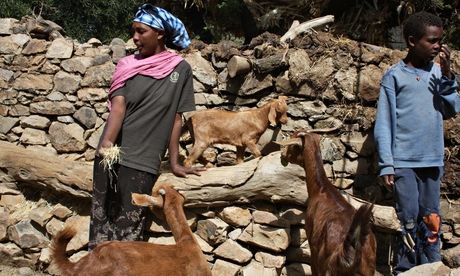
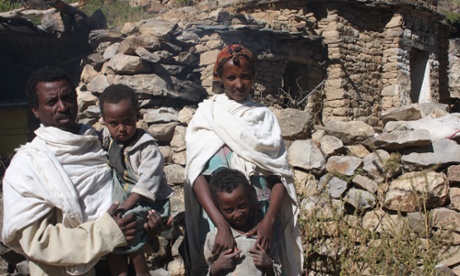
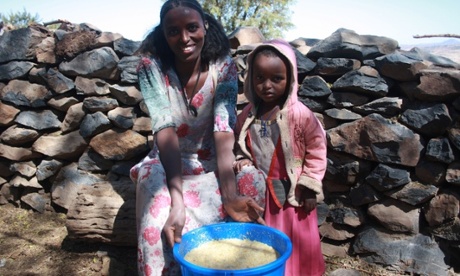
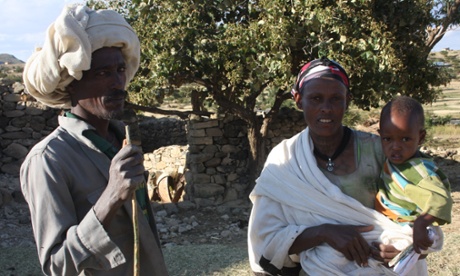

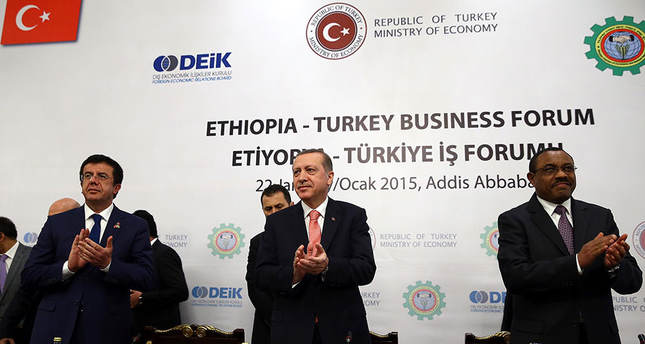














 In 2012, the Ethiopian mining sector accounted for 19% of the country’s exports revenues- mainly from artisanally mined gold- while in comparison, coffee, Ethiopia’s largest export commodity, generated 26% in export revenues.
In 2012, the Ethiopian mining sector accounted for 19% of the country’s exports revenues- mainly from artisanally mined gold- while in comparison, coffee, Ethiopia’s largest export commodity, generated 26% in export revenues. 



 VENTURES AFRICA-
VENTURES AFRICA-













 The official launch for ATTSVE was held Sunday at the MacRae Library on the Dalhousie Agricultural Campus, timed with the start of International Development Week. Minister Peter MacKay, MP Scott Armstrong, representatives from partner institutions as well as 14 deans and vice-deans from Ethiopia were in attendance.
The official launch for ATTSVE was held Sunday at the MacRae Library on the Dalhousie Agricultural Campus, timed with the start of International Development Week. Minister Peter MacKay, MP Scott Armstrong, representatives from partner institutions as well as 14 deans and vice-deans from Ethiopia were in attendance.



 Addis Ababa, 2 February 2015 -
Addis Ababa, 2 February 2015 - 



 Addis Ababa February 05/2015 –
Addis Ababa February 05/2015 –  Addis Ababa February 5, 2015 –
Addis Ababa February 5, 2015 –  Addis Ababa, 5 February 2015 (WIC) -
Addis Ababa, 5 February 2015 (WIC) - Addis Ababa February 5, 2015 –
Addis Ababa February 5, 2015 – 
 Pittards PLC, British company investing in Ethiopia, disclosed it intends to increase its production capacity by threefold in the coming two years.
Pittards PLC, British company investing in Ethiopia, disclosed it intends to increase its production capacity by threefold in the coming two years. Since taking control of the asset, KEFI’s team has presided over a 50% rise in the resource base with an increase, rather than fall in the grade
Since taking control of the asset, KEFI’s team has presided over a 50% rise in the resource base with an increase, rather than fall in the grade Addis Ababa, 4 February 2015 (WIC) -
Addis Ababa, 4 February 2015 (WIC) - Recently, JICA Vice-President Kato Hiroshi, while making a visit to Ethiopia, discussed with Industry Minister Ahmed Abitew, concerning development issues JICA can carry out in collaboration with Ministry of Industry.
Recently, JICA Vice-President Kato Hiroshi, while making a visit to Ethiopia, discussed with Industry Minister Ahmed Abitew, concerning development issues JICA can carry out in collaboration with Ministry of Industry.




 Addis Ababa, 9 February 2015 -
Addis Ababa, 9 February 2015 -  Addis Ababa, 9 February 2015 -
Addis Ababa, 9 February 2015 - 








 Addis Ababa February 11, 2015 -
Addis Ababa February 11, 2015 - Addis Ababa, 11 February 2015 -
Addis Ababa, 11 February 2015 -  Addis Ababa, 11 February 2015 –
Addis Ababa, 11 February 2015 –




 Addis Ababa –
Addis Ababa –  Addis Ababa, 10 February 2015 (WIC) –
Addis Ababa, 10 February 2015 (WIC) – 













 VENTURES AFRICA –
VENTURES AFRICA –  Addis Ababa: February 12, 2015 –
Addis Ababa: February 12, 2015 – 




 Addis Ababa, 12 February 2015 –
Addis Ababa, 12 February 2015 –  SINGAPORE –
SINGAPORE – 








